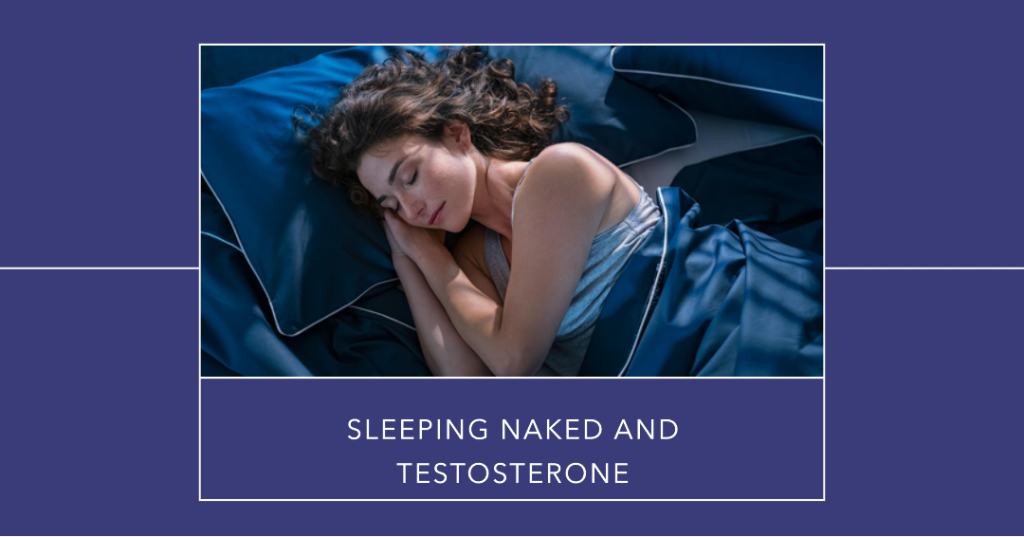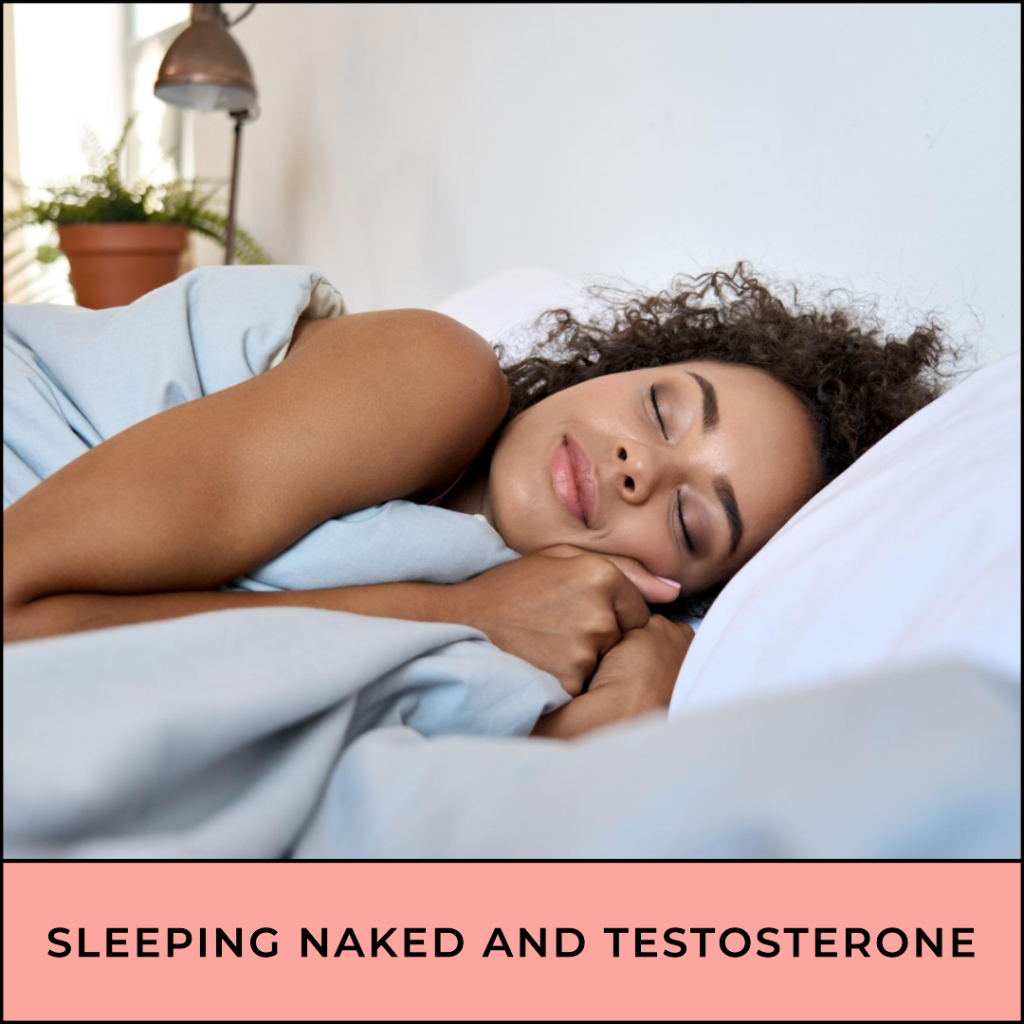Do you want to boost your testosterone levels? Have you ever wondered if sleeping naked could make a difference?
In this article, we explore the link between sleeping in the buff and testosterone production and provide you with the answer “Does sleeping naked increase testosterone?”.

Testosterone plays a vital role in your overall health, muscle growth, and sex drive. While sleep has been shown to affect testosterone levels, the impact of sleeping naked remains inconclusive.
We’ll delve into the research and provide tips for achieving optimal sleep quality and testosterone levels. Get ready to uncover the truth about sleeping naked and its potential to increase testosterone!
Key Takeaways
- Testosterone levels naturally decrease with age and can also be affected by factors like poor sleep hygiene.
- Testosterone levels increase during sleep and decrease the longer one stays awake.
- REM sleep is associated with the highest level of testosterone production.
- The effect of sleeping naked on testosterone levels is inconclusive, and personal preference and comfort should be considered when deciding sleep attire.
What Is Testosterone
Testosterone is a hormone that plays a crucial role in muscle and bone growth, sperm production, and sex drive. It is produced primarily in the testes in men and the ovaries in women, but also in smaller amounts by the adrenal glands. Maintaining hormonal balance is essential for overall health and well-being.
Testosterone deficiency can lead to various symptoms such as fatigue, reduced muscle mass, decreased libido, and mood changes. Additionally, testosterone has an important role in sexual health. It contributes to sexual desire and arousal in both men and women. Adequate levels of testosterone are necessary for a healthy sex life.
Understanding the production, function, and potential deficiencies of testosterone can help individuals take steps towards optimizing their hormonal balance and overall sexual health.
The Impact of Sleep on Testosterone
During sleep, your body naturally produces higher levels of testosterone, with REM sleep being associated with the highest production. Understanding the impact of sleep on testosterone is crucial for maintaining optimal hormone levels and overall well-being. Here are four key points to consider:

- Testosterone production: Sleep plays a vital role in testosterone production, as levels increase during restful periods and decrease with prolonged wakefulness.
- REM sleep: This stage of sleep is particularly important for testosterone production. Getting enough quality REM sleep ensures optimal hormone balance.
- Sleep deprivation: Lack of sufficient sleep leads to a decline in testosterone levels. Studies have shown that even just one week of inadequate sleep can result in a significant decrease in testosterone.
- Age-related decline: Testosterone naturally declines with age, but poor sleep hygiene can accelerate this decline. Establishing good sleep habits can help mitigate age-related hormonal changes.
To maintain healthy testosterone levels, prioritize adequate and quality sleep by practicing good sleep hygiene habits such as having a consistent bedtime routine, avoiding screens before bed, and engaging in regular exercise during appropriate times of the day.
The Benefits of Sleeping Naked
To optimize your sleep experience, consider experimenting with different sleep attire and environments that promote comfort and overall sleep quality.

Sleeping naked is one option that some individuals find beneficial for various reasons. When you sleep without clothing, it allows your body to regulate its temperature more effectively. This can be especially helpful if you tend to run hot during the night. Keeping your skin uncovered also promotes better air circulation, which can contribute to healthier skin overall.
Furthermore, many people find sleeping in the nude to be more comfortable as it eliminates any restrictions or discomfort caused by clothing. Ultimately, the choice of whether or not to sleep naked depends on personal preference and what helps you achieve the best sleep environment for yourself.
Research Into the Connection Between Sleeping Naked and Testosterone
The research conducted on the connection between sleeping without clothing and hormone levels is still inconclusive. While some studies suggest that sleeping naked may have benefits for hormonal balance during sleep, more research is needed to establish a definitive link.
However, there are several factors to consider when it comes to sleep attire preferences and their impact on hormone levels:
- Temperature regulation during sleep: Sleeping naked allows your body to better regulate its temperature, which can enhance overall comfort and promote quality sleep.
- Hormonal balance and sleep: Adequate restful sleep is crucial for maintaining optimal hormone levels, including testosterone.
- Impact of clothing on sleep quality: Wearing tight or uncomfortable clothing can restrict movement and disturb sleep, potentially impacting hormone production.
- Personal comfort and sleep habits: Ultimately, the choice of whether to sleep naked or not should be based on personal preference and what promotes the best quality of sleep for you.
Remember that prioritizing overall sleep hygiene, including establishing a bedtime routine, maintaining a comfortable temperature in your bedroom, avoiding screens before bed, and regular exercise are key factors in promoting healthy hormone levels during sleep.
Tips for Achieving Optimal Sleep Quality and Testosterone Levels
Maintaining a consistent bedtime routine and practicing good sleep hygiene can help optimize both your sleep quality and testosterone levels. To achieve optimal sleep quality and hormonal balance, consider the following tips:

- Sleep hygiene tips: Create a relaxing environment by keeping your bedroom cool, dark, and quiet. Avoid stimulating activities or screens before bed.
- Hormonal balance: Adequate sleep is crucial for maintaining healthy testosterone levels. Aim for 7-9 hours of uninterrupted sleep each night.
- Sleep temperature: Find the ideal sleep temperature that works for you. Experiment with bedding materials, adjust room temperature, or try sleeping naked with socks on to achieve the optimal sleep temperature.
- Bedtime routine: Establish a consistent bedtime routine to signal your body that it’s time to wind down and prepare for restful sleep.
- Sleep attire choices: Personal preference plays a significant role in choosing what to wear to bed. Focus on comfort and allow yourself the freedom to explore different options until you find what works best for you.
Frequently Asked Questions
Are There Any Specific Foods or Supplements That Can Naturally Increase Testosterone Levels?
There are several foods and supplements that can naturally increase testosterone levels, such as ginger, ashwagandha, zinc, and vitamin D. Incorporating these into your diet, along with lifestyle changes like exercise and stress reduction, can help maintain hormone balance.
Can Stress or Anxiety Affect Testosterone Production During Sleep?
Stress or anxiety can impact testosterone production during sleep. Sleep quality, cortisol levels, and sleep disorders can also affect testosterone. Exercise positively affects testosterone production, while inadequate sleep duration may lower testosterone levels.
Does the Use of Certain Medications or Substances, Such as Alcohol or Nicotine, Have an Impact on Testosterone Levels During Sleep?
The impact of alcohol, nicotine, and certain medications on testosterone levels during sleep is still being studied. However, they can affect sleep quality and duration, which in turn may have an indirect impact on testosterone levels.
Is There a Difference in Testosterone Production During Sleep Between Men and Women?
During sleep, hormonal differences between men and women may impact testosterone production. Sleep quality can affect testosterone levels differently in both genders, while aging and sleep disorders may also influence production. The effects of exercise on testosterone differ between men and women.
How Long Does It Typically Take for Testosterone Levels to Return to Normal After a Period of Sleep Deprivation?
Chronic sleep deprivation can have detrimental effects on testosterone levels, leading to deficiency. Sleep quality, duration, and patterns play a crucial role in testosterone production. Sleep disorders may contribute to testosterone imbalances.
Conclusion: does sleeping naked increase testosterone?
In a summary, does sleeping naked increase testosterone? – The answer to this question is still inconclusive. While sleep has been found to affect testosterone levels and some studies suggest that sleeping naked may have benefits such as optimizing sleep temperature, more research is needed to establish a direct connection between sleeping naked and testosterone.
It is important to focus on overall sleep quality and hygiene by maintaining a healthy sleep routine, avoiding screens before bed, and engaging in regular exercise. Personal preference and comfort should also be considered when deciding whether to sleep naked or not.